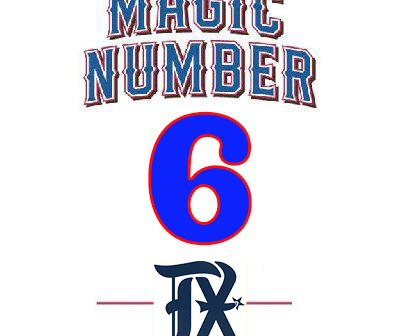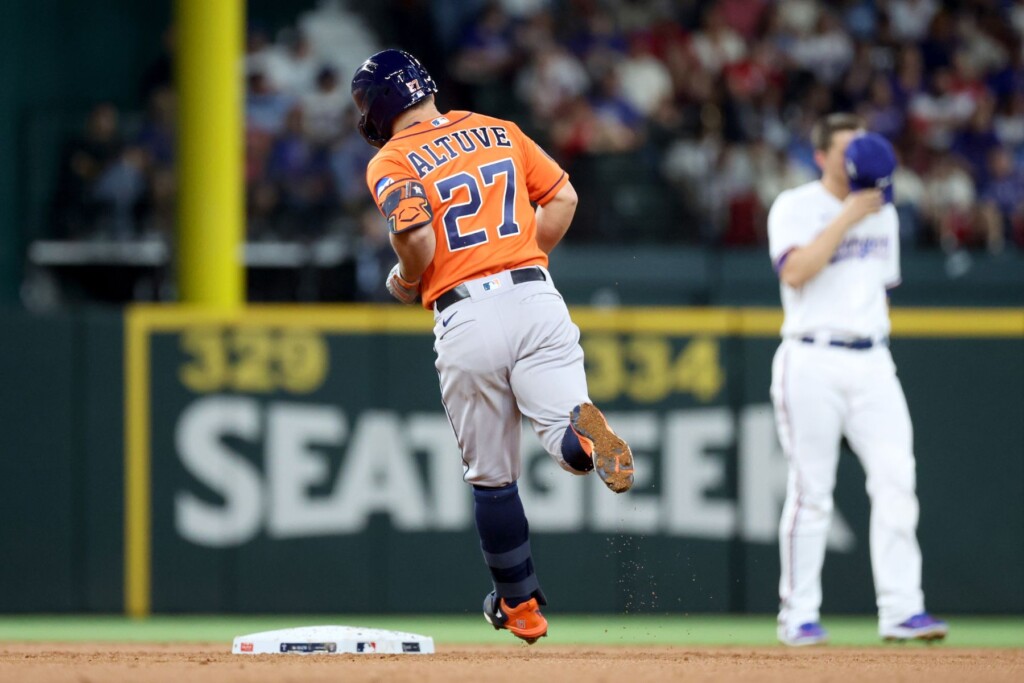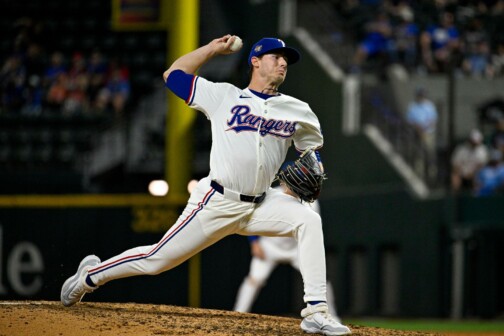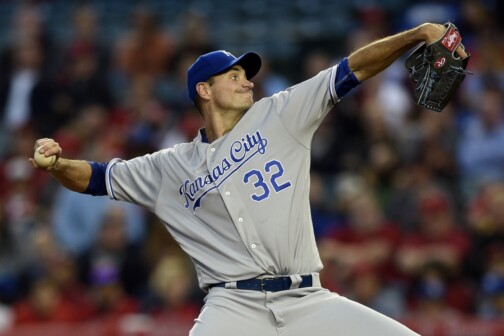Editor’s note: What’s old is new again. Mom jeans are fashionable. Same goes for loafers. You are, at most, three degrees of separation from someone with a variation of a mullet. And the Rangers are back playing October baseball.
So, back for the first time in seven years is Jamey’s Magic Number format. The premise is simple: for however many wins the Rangers have left to capture the World Series, Jamey will write that many items in this column. After losing Game 3 of the ALCS to the Astros, that number remains at 6. If they turn things around and win Game 4 on Thursday night, it will be 5. And if the Rangers go all the way? Well, that’s the only time you should be excited about a Jamey Newberg column with zero to say (even though you’ll forgive him when he inevitably finds a thing or five to remark upon the World Series trophy finally coming to Arlington).
Let’s have some fun.

Here we go: 6 things.
6. Nobody expected the Rangers to sweep this series. And that’s not the goal, anyhow.
Yes, taking Games 1 and 2 in Houston was historically significant. Teams winning the first two games of a best-of-seven postseason series have gone on to win that series 84 percent of the time (75 of 89). And since the league has gone to the 2-3-2 format, the 29 teams who have won the first two games on the road took the series 26 times (the three exceptions were all in the World Series). That’s a 90 percent success rate.
But these are the insanely streaky Rangers, who have bucked all sorts of statistical probabilities throughout 2023. And these are the defending-champion Astros, who have been better all year on the road than at home and have now won seven of their eight 2023 games at Globe Life Field, outscoring Texas 71-37 along the way.
The Rangers have proven over and over in this incredibly extraordinary roller coaster of a baseball season that anything is impossibly possible. For better and worse.
In the first playoff series the Rangers ever won, a best-of-five that went the distance against the Rays in the 2010 ALDS, the road team won all five games. In the 2019 World Series, the Astros fell to the Nationals in the first-ever best-of-seven series of any kind in which the road team won every game.
That history may have been kinder to Texas than Houston. Let’s hope the Rangers won’t need to test that path again over the next five days.
So we roll out a Magic Number today that, for the first time this month, hasn’t ticked down. With the two-game edge the Rangers built in Houston, they still hold onto a home-field advantage even with last night’s loss. But it sets up a massive Game 4 tonight, when the Rangers will send Andrew Heaney (and presumably Dane Dunning behind him) against José Urquidy in a matchup that both teams are hoping to get through before they can put their No. 1 starter back on the mound Friday afternoon.
5. For Houston, though, it was the No. 3 starter who pitched like an ace. With some help from the Rangers lineup.
The Rangers have talked throughout the postseason about the importance of getting on top of the fastball, and it has shown. Over and over, the lineup has driven baseballs to the gaps and through holes to create sustained offense. In Game 3, they were unable to do that against Cristian Javier. Lazy flies were in heavy supply all night. Javier got only three groundouts, and his relief mates got two others.
The Javier four-seam fastball—which accounted for all 10 pitches he threw in the first inning and his first four in the second—is designed to do just that, with elite spin rates that hitters tend to get under despite low-90s velocity. Though he threw only 60 percent of his pitches for strikes Wednesday night (including 22 strikes and 20 balls through three innings), the exit velocities on the pitches the Rangers did connect with were destined to turn into outs. Texas was no-hit until Nathaniel Lowe punched a center-cut fastball the other way for a single in the fifth inning; Josh Jung followed by depositing a badly located slider over the wall in right-center.
The Astros got good Javier in Game 3: he had a 4.56 ERA in the regular season, which included a 5.63 mark in August and September. But last night, he allowed his only two runs in three October starts (the key regular-season finale plus two playoff games). If this series goes the distance, Houston will be able to hand him the ball again for Game 7. That’s concerning.
As might be the Rangers’ plans for that same game.
There were positives to take from Max Scherzer’s first start in a month. The velocity was there, and he came out of the game healthy. But the 39-year-old lacked command of his slider, as imperative a pitch in his arsenal as the four-seamer is in Javier’s. And in the pivotal at-bat of his night, a two-out, bases-loaded matchup with the light-hitting Martin Maldonado in the second inning, Scherzer spiked the slider for a run-scoring wild pitch, then grooved a 94-mph fastball that Maldonado lined past Jung to bring in two more.
The sequence gave Houston its first lead in the series. When the Rangers went down in order in the bottom of the frame, it was only the second inning in the postseason that ended with them trailing.
Hopefully, Game 3 wasn’t Scherzer’s final act of 2023. But in contrast to Rangers hitters’ soft flies for much of the night, the Astros drove pitches to the warning track all game long. If anything, Scherzer and the Texas bullpen might have been saved by Globe Life Field’s dimensions a few times.
Including once by an outfielder who made sure the dimensions weren’t inadequate.
4. I’ve been critical of Leody Taveras’s feel for the wall this season. There have been times when he has appeared slightly tentative on balls that took him to—or led him to stop short of—the track. That was decidedly not the case in the top of the sixth.
Yordan Alvarez, who seemed irritated in his pregame presser that news of the illness that possibly slowed him down in Game 1 leaked out of the clubhouse, was drilled on the instep of his back foot on a stray Scherzer cutter in the second inning. Scherzer then got him to pop out to shortstop to end the third. It provided little comfort. After Alvarez’s two-homer barrage in Game 2, it just felt he was due after that.
Cody Bradford, who had relieved Scherzer and pitched a clean fifth, returned to the mound in the sixth with a clear job to do: face Alvarez, who destroys lefties (.892 OPS this season), which is still well shy of the 1.044 OPS he puts up against right-handers), and then give the ball to the manager.
It’s shocking that the ball Bradford handed to Bruce Bochy was the same one he had just thrown Alvarez.
The rookie southpaw pitched Alvarez fearlessly, missing narrowly with a 91-mph fastball low and away and coming inside with a 90-mph fastball to fall behind, 2-0. It seemed to be a perfectly acceptable approach, staying around the zone to see if Alvarez would bite, and if the matchup ended in a walk, acceptable harm done.
Then Bradford dotted the outside of the zone with a breaking ball. Alvarez crushed it. And stood watching it. The ball, on a 111-mph cruise, traveled an estimated 416 feet, about 20 feet to the right of the “410” painted nearby on the wall that denotes the deepest part of the field of play.
It wasn’t enough.
Taveras scaled the wall and snared the drive after it had cleared the 8-foot fence. The score remained 5-2. The building, which had come back to life minutes earlier on Jung’s first home run, was in a frenzy.
Chris Stratton came on and retired Jose Abreu and Mauricio Dubon around a Kyle Tucker walk. Minutes later, Adolis Garcia followed an Evan Carter double with what appeared to be as certain a run-scoring double as Alvarez’s shot had appeared to be destined for the seats. But Michael Brantley, 36 years old and never known for his defense, ran it down in the gap with an outstretched backhand grab and a tumble, ending the inning and the threat—and stealing a run just as Taveras just had minutes earlier.
The Rangers, with all those road wins in Tampa Bay, Baltimore, and Houston the last few weeks, have gotten used to playing in front of silenced crowds. Not so fun when it’s your own.
But man, that Taveras catch. On a day when five Rangers were named as Gold Glove finalists, Taveras was not among the three who made the cut in center field (Julio Rodriguez, Luis Robert Jr., and Kevin Kiermaier got those nods). In the sixth inning, Taveras made a case that maybe he should have been.
3. Jung was probably slighted even more, failing to crack a top-three at third base that includes Alex Bregman, Matt Chapman, and Jose Ramirez. But the impact he made in Game 3 was at the plate.
When the Rangers came up to bat in the fifth, Houston had five runs on five hits. Texas had zero on zero. One pitch after Jung fell behind Javier that inning, 1-2, the Rangers had two on two.
The meaty slider Jung drove to right center looked like so many of the home runs he hit at Texas Tech, back when scouts questioned whether he would develop enough pull power to become a slugging threat at the major-league level.
Two innings later, he deposited a high Hector Neris fastball—once again following a Lowe single—well over the wall in center field, restoring a three-run deficit that the Rangers had squandered the inning before (more on that shortly).
A third opportunity to put a ball over the wall and a pair on the board came up short in the ninth. After Mitch Garver had walked and Lowe fanned on a high Ryan Pressly fastball, Jung bounced into a routine double-play with a three-hopper to shortstop, ending the game.
But that might not have been when it was lost.
2. To be fair, no one moment cost the Rangers this game. Javier was nails, Scherzer was rusty, the Astros hit baseballs hard all night, and the Rangers didn’t.
But the seventh inning was interesting from a game-planning standpoint.
It was a little surprising to me that it was Stratton who was getting loose in the sixth as Bradford finished his assignment. Between Bradford, Heaney, Dunning, Jon Gray, and Martin Pérez, it wasn’t clear which two would likely be held back for Game 4 if all went as planned. By game’s end, we knew that Bochy and Mike Maddux had designed things so they could use Bradford, Gray, and Pérez in Game 3, as needed.
Stratton hadn’t pitched in 22 days—and in the two games in which he appeared in the regular season’s final week, he allowed four runs on seven hits in two-thirds of an inning. But he was called on to finish Bradford’s sixth. He got Abreu to line out to Garcia and coaxed an opposite-field, warning-track flyout to right from Dubon. Sandwiched in between was a five-pitch walk to Tucker (then hitting .087 in the postseason), in which Stratton missed badly on three of those pitches.
I assumed Gray—coming back from a 23-day layoff but certainly no less trustworthy than the equally rested Stratton—might get the seventh. But Stratton was sent back out.
He fell behind Jeremy Pena but got him to bounce out. By then, Stratton had thrown six balls and six strikes. After that, he fell behind Maldonado and yielded a single to center. Then he fell behind Jose Altuve, who shot a single to left.
With the left-handed-hitting Brantley and Alvarez due up on either side of the right-handed Bregman, Bochy went to Will Smith—not Pérez, even though a ground ball was the objective. It went as poorly as so many of Smith’s outings have the last couple months. He fell behind Brantley but got him to line softly to center on a solid play coming in by Taveras. Then he walked Bregman on five pitches, four of which were nowhere near close enough to tempt the disciplined Bregman into swinging.
Smith had one more hitter left to reach the three-batter minimum: Alvarez—with the bases loaded. A fascinating sequence followed a mound visit. Smith threw Alvarez four low-90s fastball out of five pitches, surely designed to catch him off balance given that Smith’s slider is virtually as certain a go-to as Mariano Rivera’s cutter was. He got Alvarez to swing through the first one and take pitch four for a strike, and he might have even fooled Alvarez with the fifth pitch, a 93-mph fastball in the zone and on his hands. But the 26-year-old is strong enough to turn getting fooled into a positive, and he muscled the pitch to short center. Two more Houston runs crossed. The Astros’ lead was suddenly 7-2. “He’s one of our guys,” Bochy said after the game of the decision to bring Stratton back for the seventh after he got out of the sixth.
No argument, and even if there were one, Bochy and Maddux have far and away earned the right not to be second-guessed by well more than 99 percent of those watching what happened. It just seemed interesting that Gray—who came on and ended the inning in one pitch, then got two more outs in the eighth—wasn’t given a clean inning with a game that was not out of hand, considering Stratton had been unused for just as long and had seemed to fall out of high-leverage situations before that.
1. A final thing before we get out of here and turn our attention to Game 4—and no, not about Creed, who was in the ballpark for the planned singalong.
I got some comments-section pushback from Astros fans who were offended that I had the audacity to suggest Evan Carter had earned some Kyle Tucker comps.
I thought about that when Carter destroyed a down-and-in Javier fastball at 109 mph, barreling it up with so much force that Tucker froze in straightaway right, expecting the line drive to lose enough steam along the way that he’d be able to glove it. No such luck. The ball cleared Tucker, and Carter had a two-bagger. (The Brantley snare of Garcia’s shot to left center followed.)
Carter, not Tucker, has been the one ripping through the postseason. He’s hitting .333 in 32 plate appearances, reaching base at a .500 clip with more walks than strikeouts, and six of his eight hits have gone for extra bases to help build an OPS of 1.167. Meanwhile, Tucker, who is bound to get MVP votes after a strong regular season, is hitting .125 in 30 trips with a .508 OPS.
And that’s after a night in which three different Rangers pitchers walked Tucker, all before he crushed a double to right off Smith that ended up being the Astros’ final at-bat of the game as Garcia-to-Corey Seager-to-Jonah Heim cut Alvarez down at the plate. (With two outs on the board, the glove-up deke by Garcia made no sense or difference, by the way.)
I’m more than a little terrified that Tucker is about to go off after being held down by Texas and Minnesota for six games. I suppose Houston fans are just as fearful that Seager (and Marcus Semien, to an extent) won’t stay in a relative skid the whole series, either.
Tonight would be a good time for those two to break out on Jose Urquidy. Game 4 quickly has become pivotal.
Author







